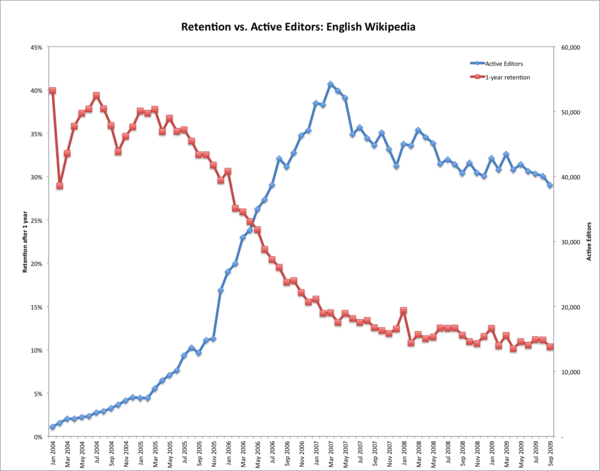
Here’s what we think the Editor Trends Study tells us: Between 2005 and 2007, newbies started having real trouble successfully joining the Wikimedia community. Before 2005 in the English Wikipedia, nearly 40% of new editors would still be active a year after their first edit. After 2007, only about 12-15% of new editors were still active a year after their first edit. Post-2007, lots of people were still trying to become Wikipedia editors. What had changed, though, is that they were increasingly failing to integrate into the Wikipedia community, and failing increasingly quickly. The Wikimedia community had become too hard to penetrate.
As the graph shows, while the number of active editors shot up from 2005, the retention rate of editors, those who are still active a year later, shot down. So there are more editors, but they quit editing earlier. Which in turn means that you have a hard core of longterm, dyed in the wool editors who know how to game the system and a much larger mass of people who discover Wikipedia, start editing and usually drop out in a couple of months, either because they lose interest or because they’re driven out by the hardcore. Editing Wikipedia is not fun anymore.
Three reasons for this is: notability, verification and rules lawyering in general. It used to be that Wikipedia culture was fairly tolerant of people following their own interests, putting up entries on lesser known webcomics say and appreciated their efforts. But just when Wikipedia really took off, in 2005-2006, the rules started to change and anything that couldn’t be found in the Encyclopedia Brittannica was suddenly not noticable enough to be in Wikipedia either. The balance in Wikipedia culture switched over from erring on the side of inclusiveness to “when in doubt, delete” — with quite a few editors seeing it as a holy mission to get rid of “fancruft”, insulting and alienating just those people who would’ve made good recruits.
At the same time, responding to a couple of scandals (some more so than others), editing existing articles became harder as well, as verification became the magic word. Every fact had to be verified, linked to some source that proclaimed its truth. It’s not an unreasonable rule, it’s the way it has been used that’s the problem. Too often new editors have had their their heads bitten off for innocently adding facts without verification, or using “suspect” sources, or for using sources not easily verificable or for just happening to disagree with a particular editor’s hobby horse. And verification, like notability is also increasingly used in editor fights, as disagreeing editors nitpick each other’s editors.
Which brings me to the rule lawyering that this emphasis on process over content brought with it. Wikipedia could always be gamed, but when following the rules correctly became more important than actually writing articles, it became that much easier to do so. Too many editors who where more interested in playing this game than in improving Wikipedia became administrators or got themselves in other positions of power and hence warped the project towards their interests. It doesn’t help to improve Wikipedia, but of course winning your fights with other editors because you can twists the rules better is much more important…
However, the fact that the Wikimedia Foundation has finally woken up and recognised this danger is a good sign. Hopefully they will actually do something about it as well: relax the rules on noticability and verification, get rid of the rules lawyering and get back to making Wikipedia a good encyclopedia.
(Via Vuijlsteke.)
Two links on trouble with databases | History and Futility
April 8, 2011 at 3:42 pm[…] Wisse writes (“Wikipedia finally notices it’s in trouble”) that Wikipedia’s famously open system of volunteer editors is collapsing, only a hard-core […]
Andrew R.
April 8, 2011 at 4:05 pmHey, occasional commenter at Randy’s and James Nicoll’s LJs here.
I just wanted to note that I actually think that a little bit of paring down is actually quite helpful to Wikipedia. I’m a historian, and these days, when, say, I’m working on lecture prep, I feel much, much more comfortable checking a Wikipedia article than I would have a few years ago. There are even a few egregious errors that I’ve noted on Wikipedia that I haven’t thought worth correcting that have, in the last few years, been either removed or at least flagged with a “citation needed.”
I’d much, much rather have a smaller pool of posters who know what they’re talking about than a larger pool of uninformed ranters.
My favorite example is the Wikipedia article on Ninjas. The original article was terrible. Then, in 2009, someone came out and stepped up to the plate and completely re-wrote it. His broadside in the talk page as to why he was re-writing it should be repeated in full:
“This article is awful. It is a wretched hodgepodge of pop culture fancruft, adolescent fantasy, and unsubstantiated myths. It has drawn criticism (and rightly so) from a whole slew of editors, yet show no sign of improvement over the last four years. No effort whatsoever has been made to ascertain the scholarship of any section in the article, nor to distinguish reality from legend. It is a shameful repository of Wikipedia’s failings, rolled together into one tumorous avatar — so that when Wikipedia’s critics crone, they cast out their fingers and point towards it in unison.”
So the current article reads like it’s got links to actual scholarship as opposed to an excited fanboy’s scribbling.
In addition, I think that it’s been very, very good that Memory Alpha came along and came to serve as the repository for people’s knowledge of Star Trek minutiae. It means that Wikipedia’s a little bit less charming, but it means that the article on the USS Vincennes shooting down Iran Air Flight 655 no longer outlines which Star Trek episodes have a similar plot.
I very much prefer the new, snootier Wikipedia.